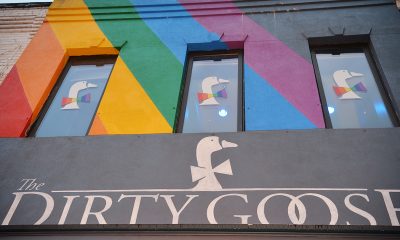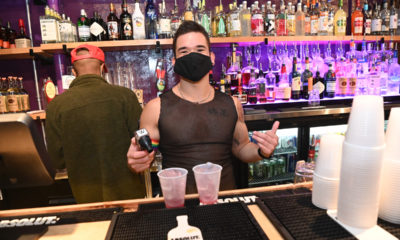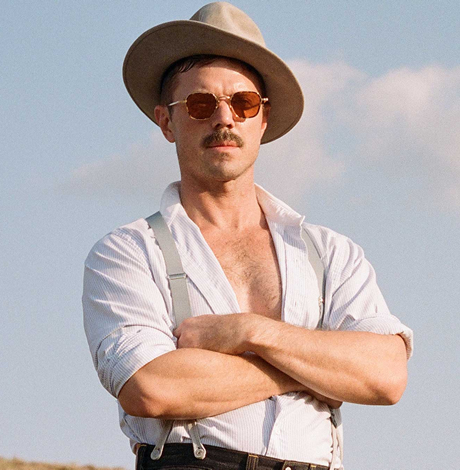Arts & Entertainment
Queery: Mikey Torres
The Glitterlust lead singer answers 20 gay questions
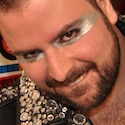
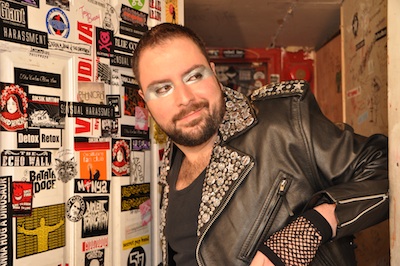
Mikey Torres (Washington Blade photo by Michael Key)
Mikey Torres and his boyfriend of five years Dan Sherwood are both into music, albeit of wildly different varieties — Torres is the front man of local band Glitterlust, a queer outfit he says is a cross between Marilyn Manson and Scissor Sisters. Sherwood is an opera singer.
“We don’t perform together or collaborate musically,” Torres says with a laugh. “He tries to educate me on things whereas I taught myself every instrument I know. He’s much more a musician. I see myself as an entertainer where it’s all about music, sets and costumes. In the band, we don’t take ourselves too seriously.”
Glitterlust, which formed last April and debuted at last year’s Phase Fest, is Torres, lesbian guitarist Liz Wooley and bi bassist Chris Roudiez. They perform mostly Torres’ originals but occasionally do covers. They have two upcoming appearances — look for them at Homopolitan at Velvet Lounge (915 U St., N.W.) on Feb. 18 where they’ll co-headline with burlesque outfit D.C. Gurley Show and lesbian R&B group the CooLots (Doors at 8, show at 9; $8 tickets available at the door, 21 and up). And on Thursday they’ll open ’80s night at Chief Ike’s Mambo Room (1725 Columbia Rd., N.W.) at 8 p.m.
Torres says he likes to explore the nuances of gay life, especially sex, from a queer perspective.
“I think it’s an artist’s job to question what’s put out there for us,” he says. “Ultimately art is not a statement, it’s a question mark. You can’t close everybody in the hetero-normative bubble.”
The band put out an EP last year called “Beautiful Noise” on Band Camp. They’re working on an indie album — tentatively called “Chaos Magic” — for release this year. All three members work day jobs — Torres is sous chef at Dupont Circle hotel The Beacon. They play in the region about three times per month.
“If success comes, we certainly won’t turn it down but I think we’re really lucky to live in a time when the record contract is not the ultimate goal,” he says.
Torres and Sherwood live together in Oxon Hill, Md. Torres enjoys music, cooking, sewing, crafts and “anything creative,” he says.
“I’m sort of a punk rock Martha Stewart.”
(Blade photos by Michael Key)
How long have you been out and who was the hardest person to tell?
I’ve been out pretty much my whole life, I wasn’t born, I sauntered out of the womb! The hardest person to tell was myself.
Who’s your LGBT hero?
Probably John Waters, while I love his sense of humor and creative quirkiness, he continues to be a pioneer and push the boundaries of American culture and cinema.
What’s Washington’s best nightspot, past or present?
Past, I’d say The Edge circa 2000-2002, I was a big raver back then and that club picked up where Tracks left off. Present, the 9:30 club, I’ve seen shows in there that have literally changed me as a person.
Describe your dream wedding.
I don’t really think I’ll ever get married, but if I did, it would be an 80’s-themed wedding with drag queen ushers dressed as ’80s icons like Molly Ringwald, ’80s Madonna and Boy George!
What non-LGBT issue are you most passionate about
Agriculture and food processing/labeling in America. I think we should tax junk food, soda and fast food and it should be illegal to sell those items in the public school system.
What historical outcome would you change?
The birth of Jesus. While I think all religions begin with the best intentions, as a gay person I also believe that religion has done far more harm than good to our community. I understand that most of the time it’s the extremists who are misinterpreting the context, however I think society as a whole would be far more evolved if we put our faith into science and art.
What’s been the most memorable pop culture moment of your lifetime?
The acquittal of Michael Jackson in 2005. I was working as a bartender at a chain restaurant at the time and all the TVs were on when it was announced. All the black people in the bar cheered while most of the white people protested and sneered. It was the first time I’d seen such direct and unapologetic racism.
On what do you insist?
Good manners and punctuality.
What was your last Facebook post or Tweet?
“Back from Vegas, I’d tell you all about it, but you know what they say!”
If your life were a book, what would the title be?
Larger than life is just the right size”
If science discovered a way to change sexual orientation, what would you do?
Feel pity for those not strong enough to endure their true nature.
What do you believe in beyond the physical world?
I believe that if there is a “God,” then it is an artist. I think to be creative is the closest you can get to really understanding God. I also believe that morality is a personal issue not a spiritual one. I don’t think any “spiritual” person has the right to tell you having sex or doing drugs is wrong.
What’s your advice for LGBT movement leaders?
To stop being afraid of offending some people. There are some great LGBT leaders out there, but most of them seem to be walking on political eggshells. We’re so worried about being seen as “normal,” the Human Rights Campaign wants the right wing to see us as heteronormative, monogamous white-picket fence-type families. I think it’s great that those types of gay families are out there, but we shouldn’t have to adapt to that ideal to get equal rights. There are plenty of successful non-monogamous couples, triads, open relationships, non-traditional families that are probably more “normal” and well adjusted than most straight families.
What would you walk across hot coals for?
The chance to go into space!
What LGBT stereotype annoys you most?
When someone thinks that because I’m gay I won’t fight back when you call me fag. I’m from P.G. County, I’m not afraid to stand up for myself.
What’s your favorite LGBT movie?
“The Trip.” I love how they weave in footage from critical moments in gay history.
What’s the most overrated social custom?
Saying “bless you” when someone sneezes. Just say “Shut up!”
What trophy or prize do you most covet?
Not really a prize, but I’d love to go on tour with my band and see the world while entertaining people.
What do you wish you’d known at 18?
Nothing. I think that everything happens for a reason and if you’re happy with where you are, you can’t bitch about how you got there!
Why Washington?
The more I travel, the more I realize how great D.C. is! We have so much history but also constantly evolving culture. In one day you can see the monuments, eat amazing Ethiopian food and see a great drag show! I love all the culture here, how you can meet people from all backgrounds and everyone has a story.
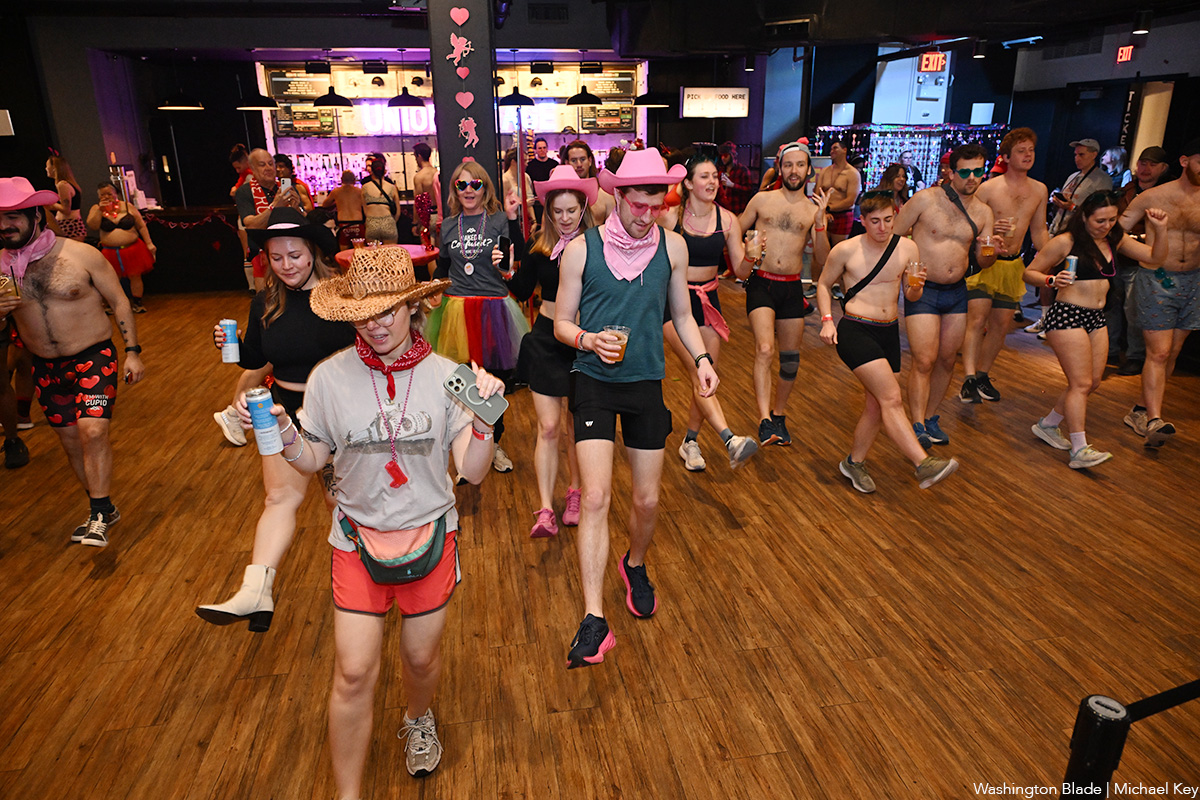
Cupid’s Undie Run, an annual fundraiser for neurofibromatosis (NF) research, was held at Union Stage and at The Wharf DC on Saturday, Feb. 21.
(Washington Blade photos by Michael Key)
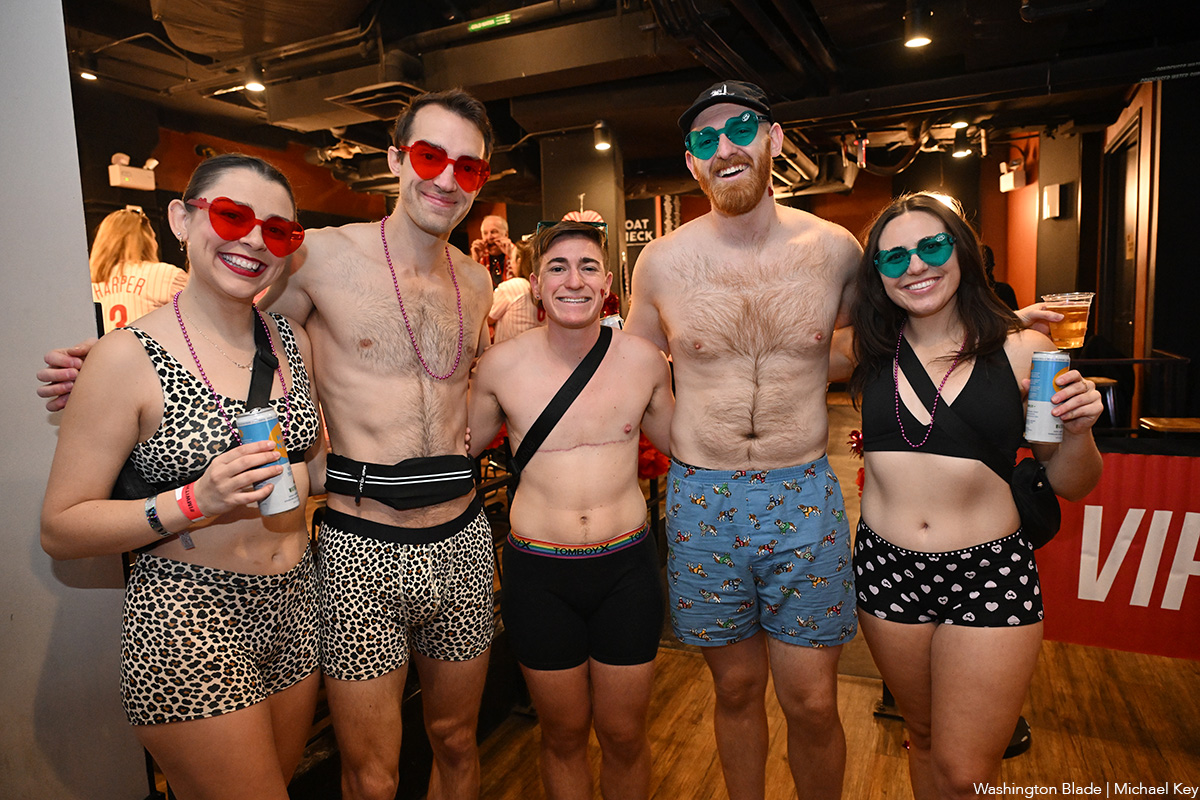
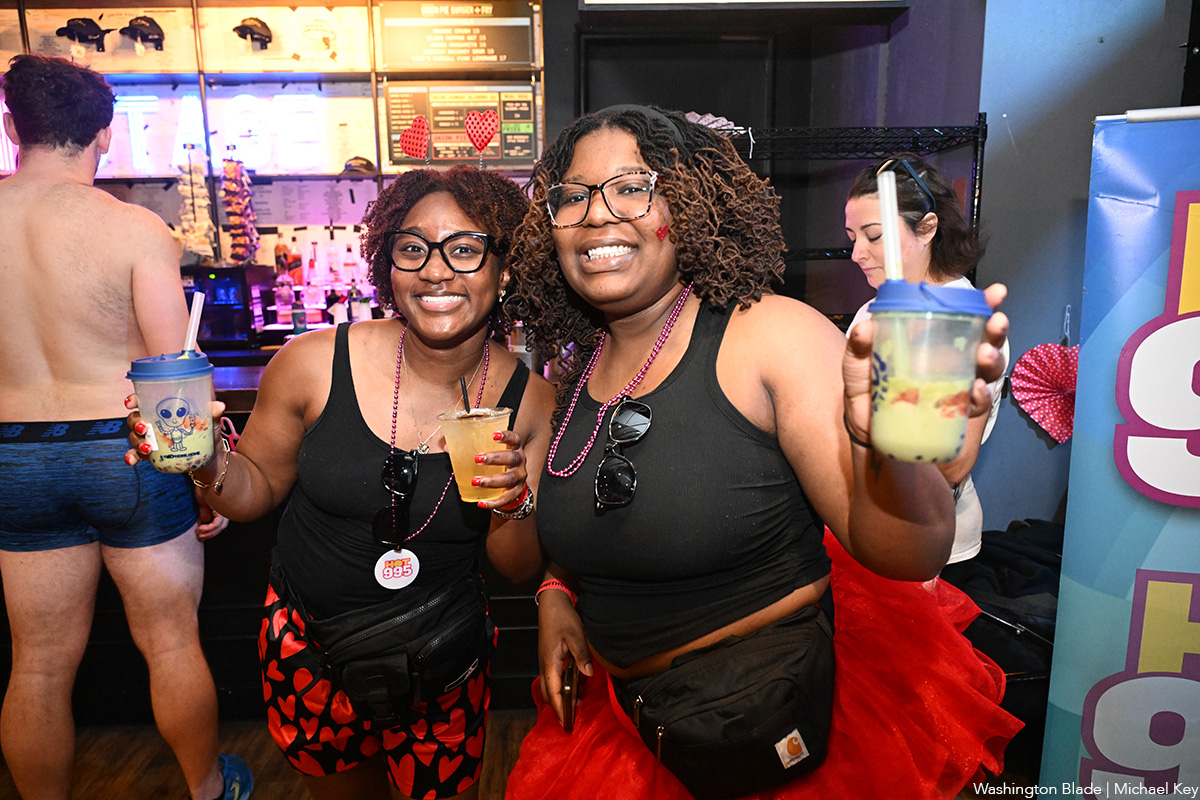
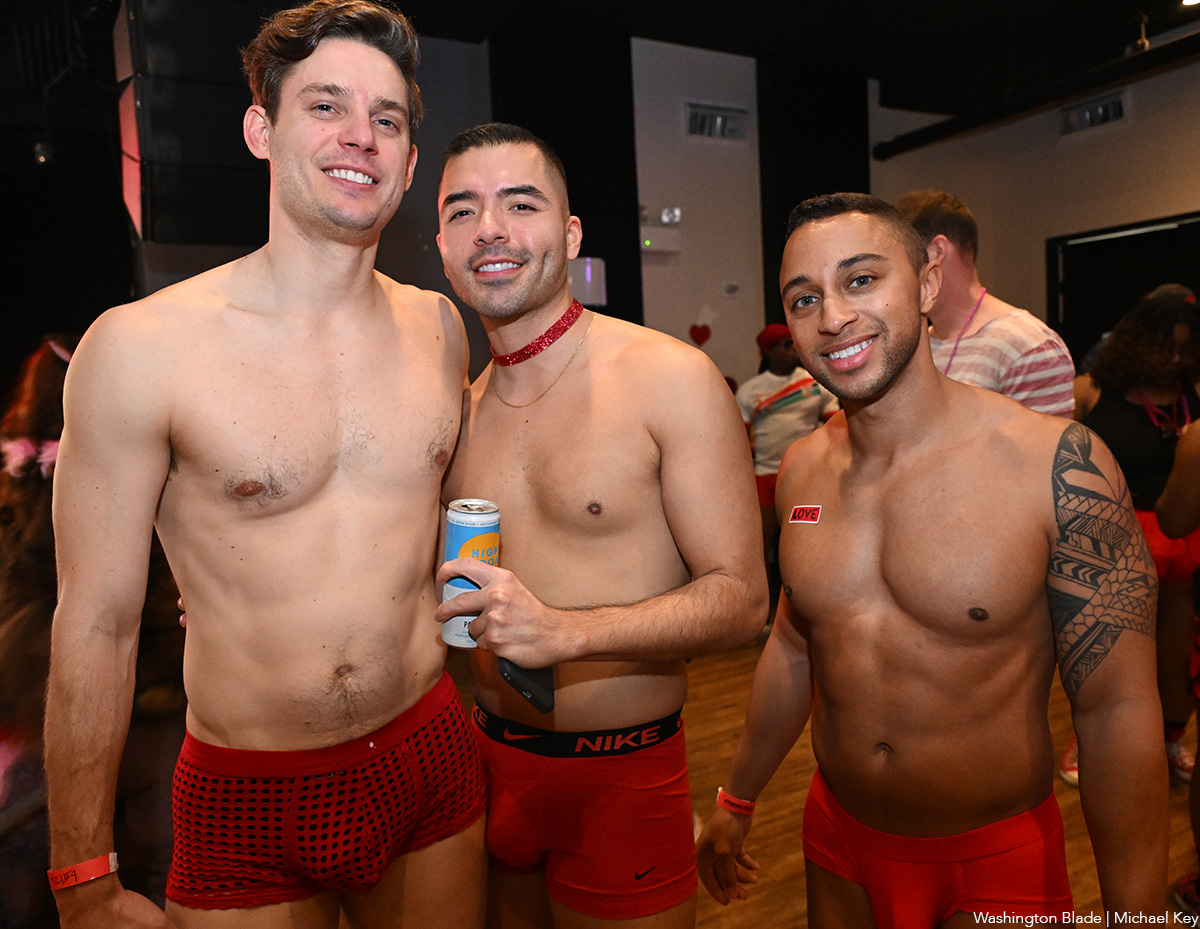
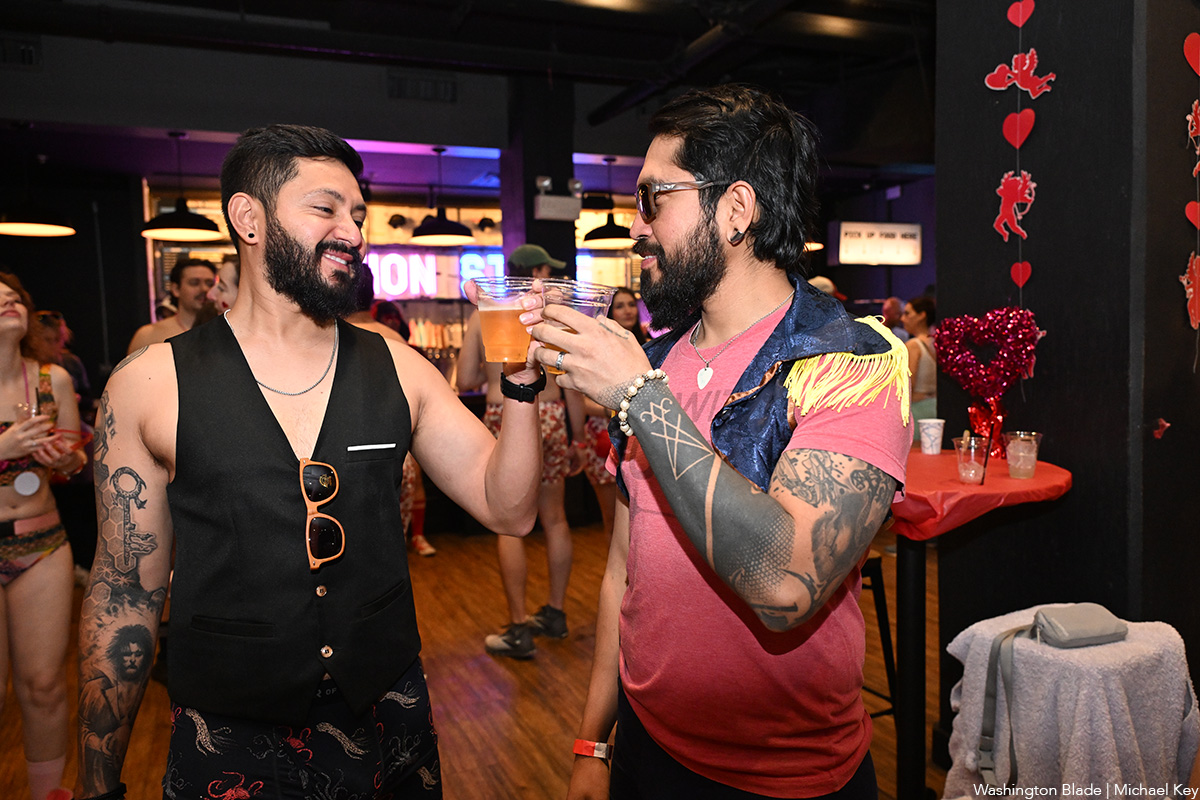
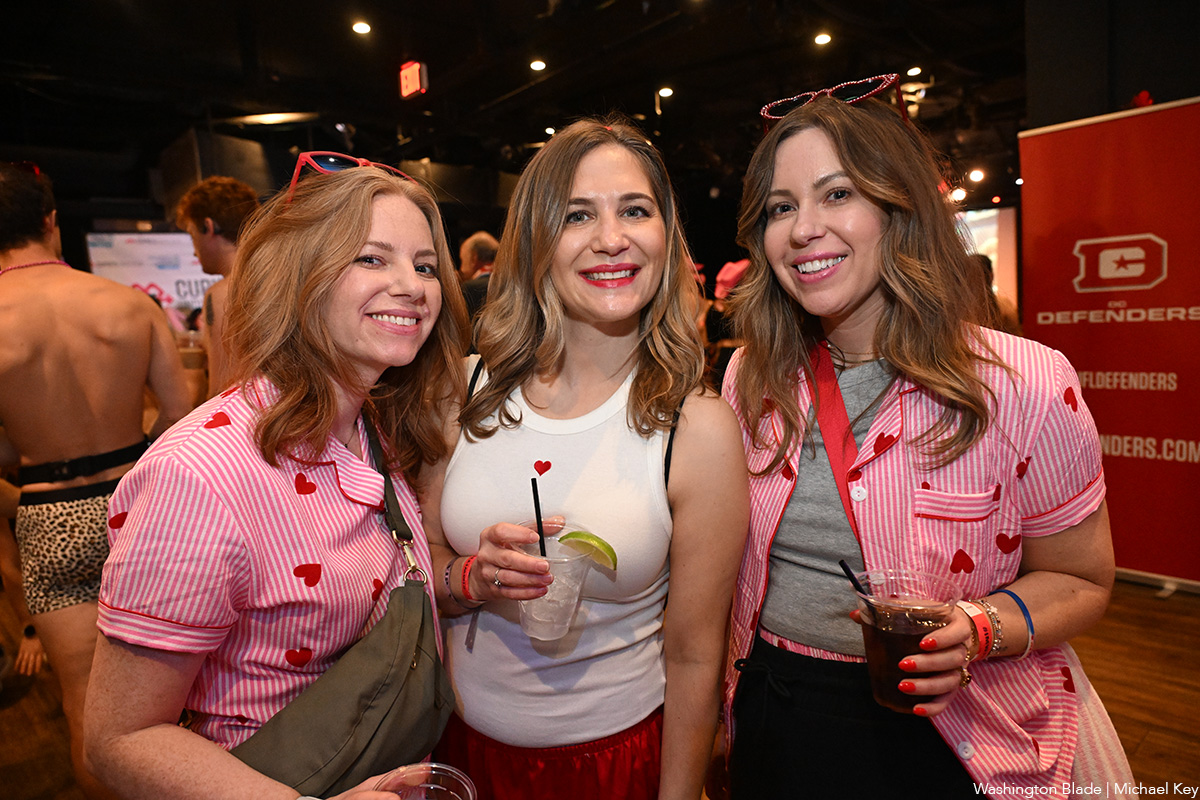
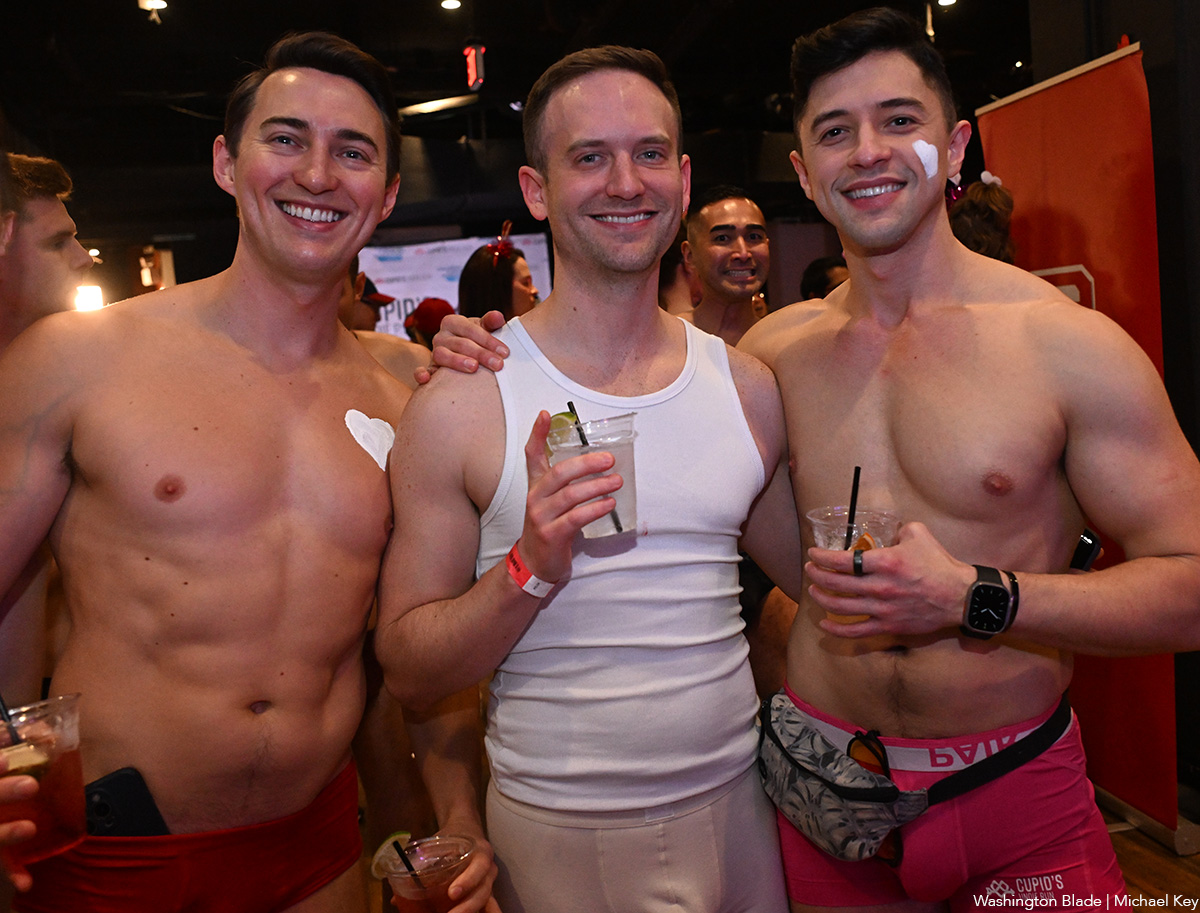
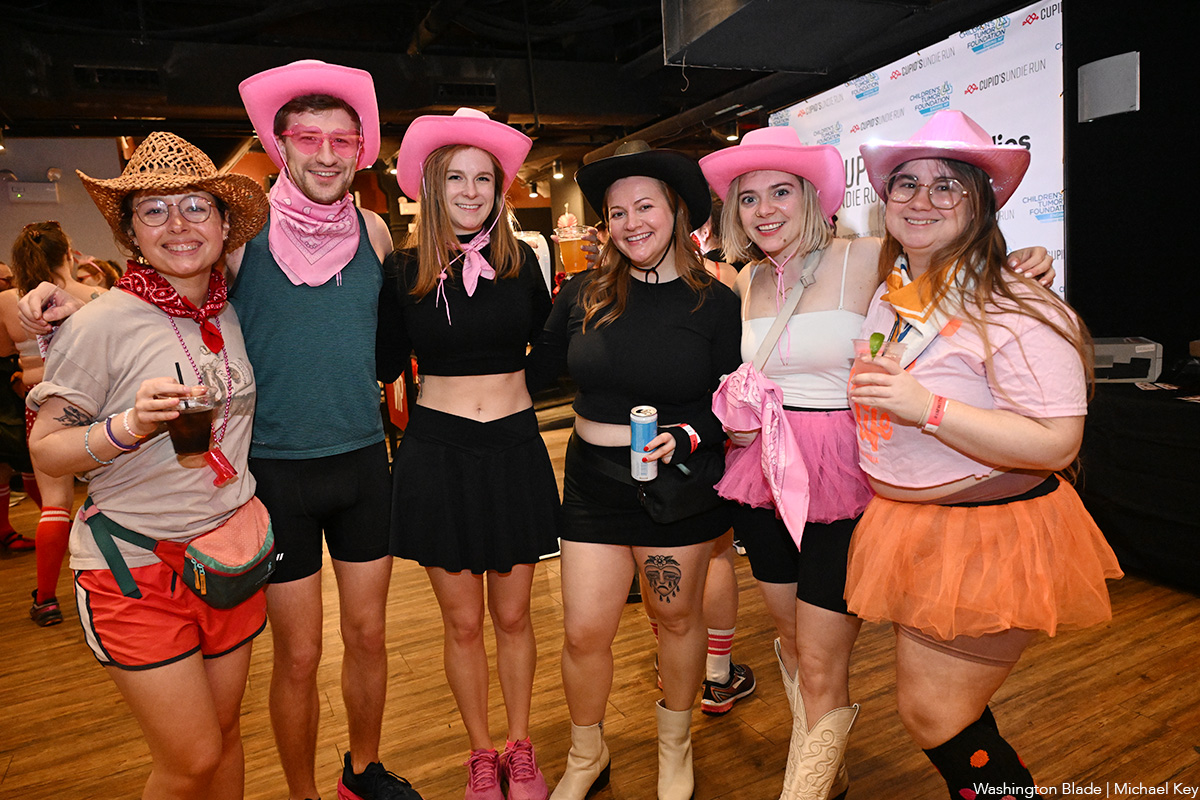
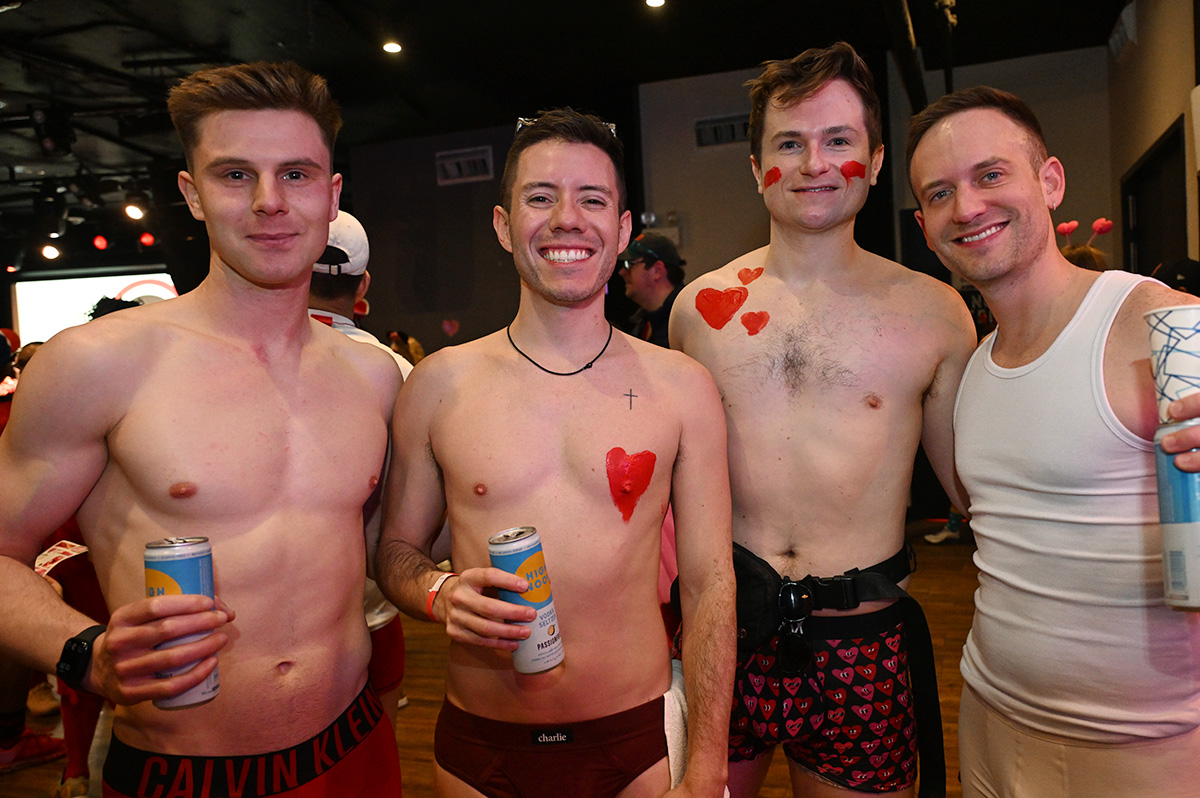
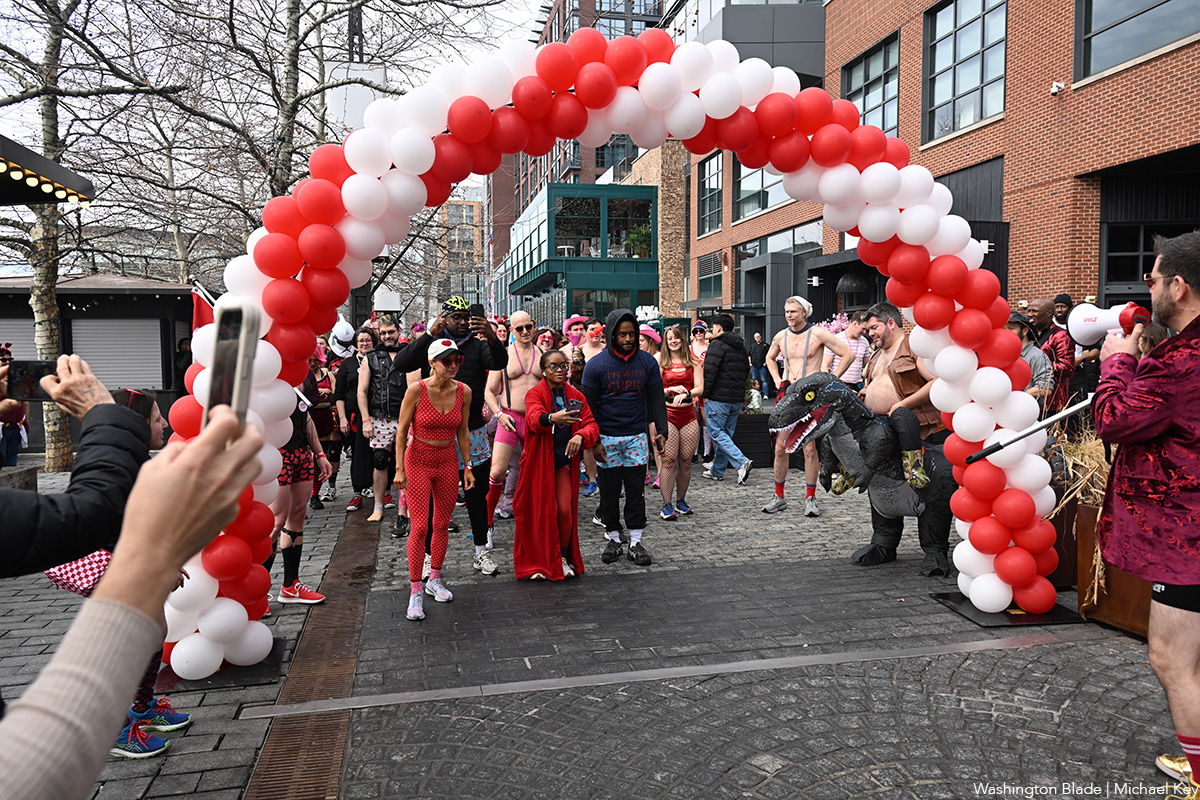
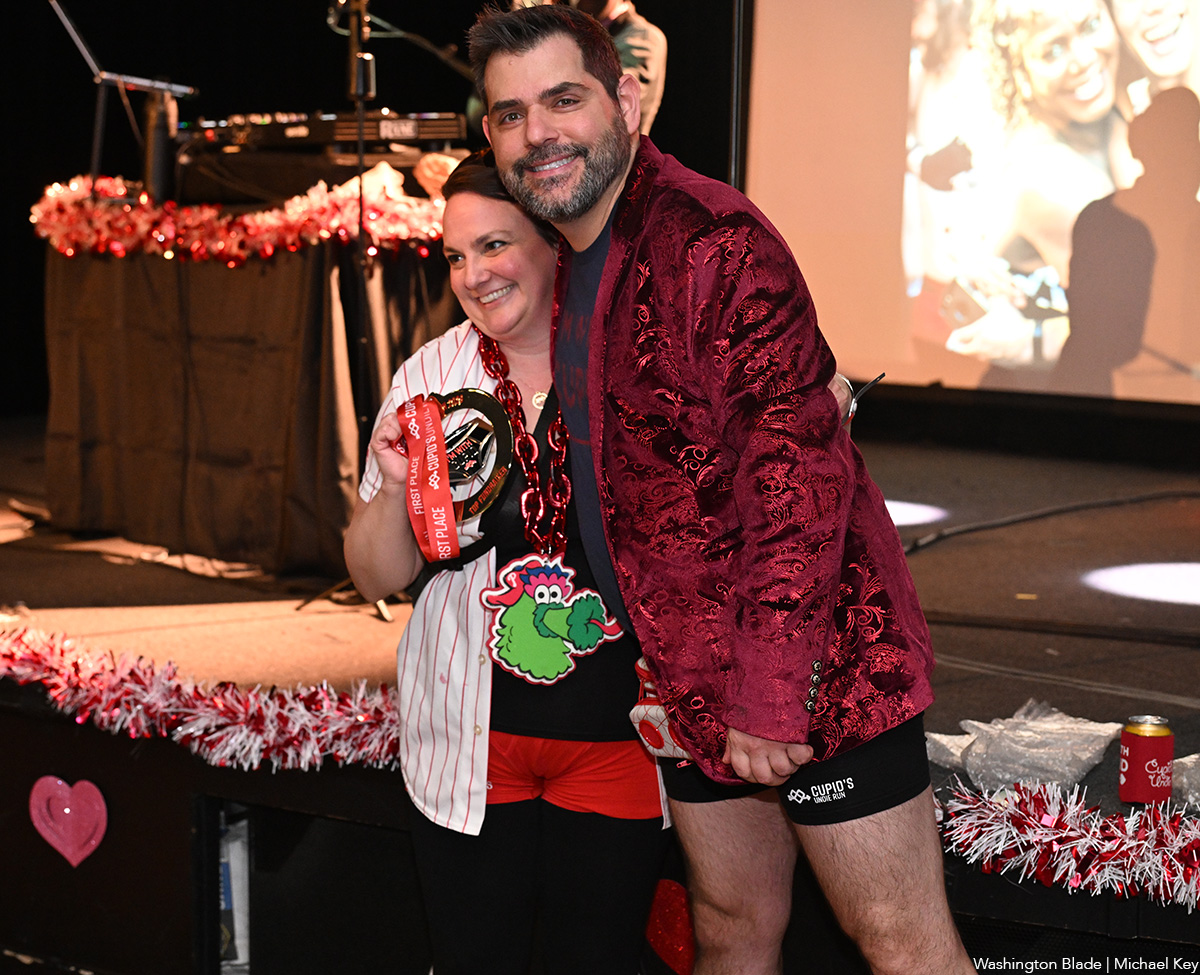
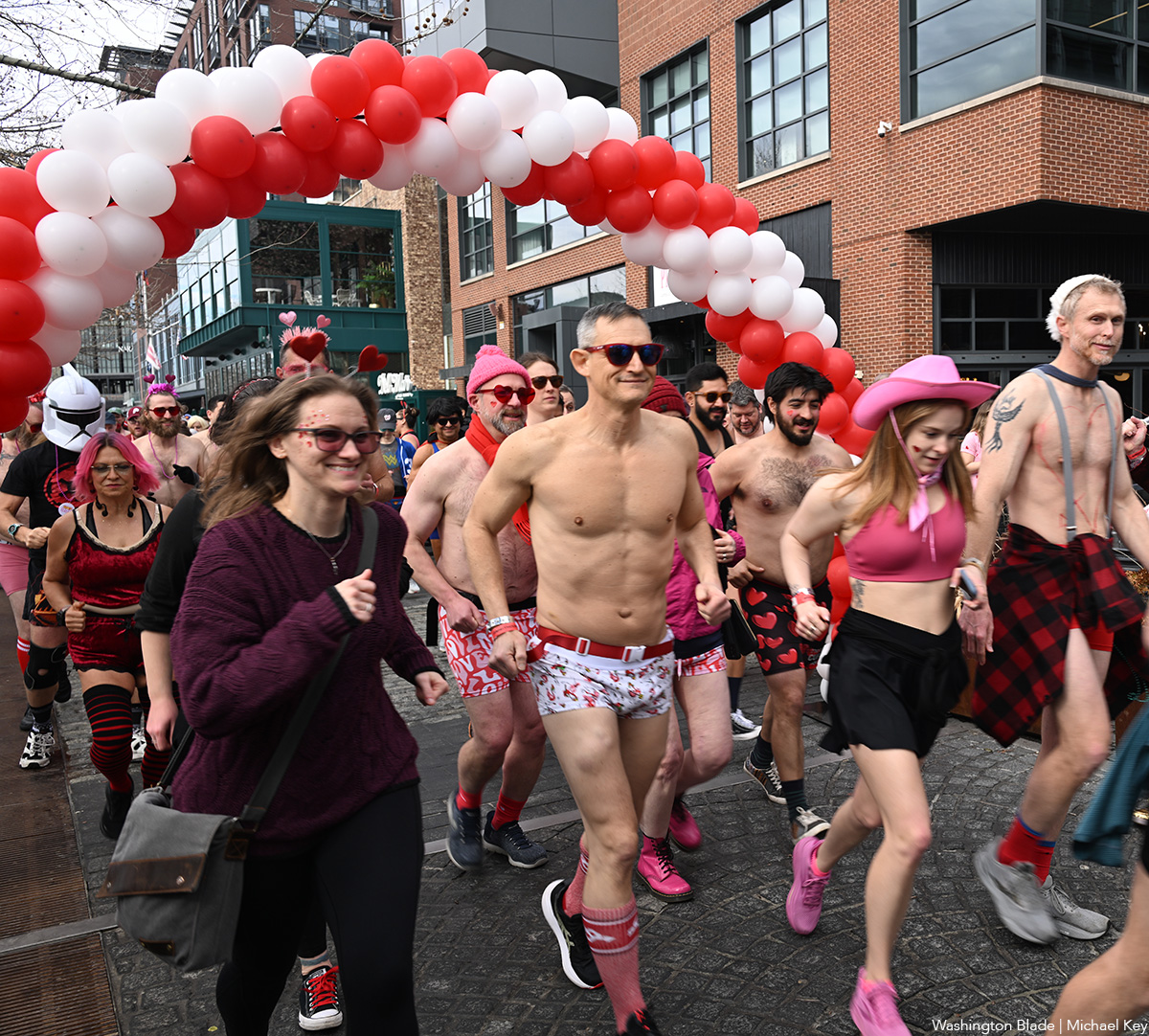
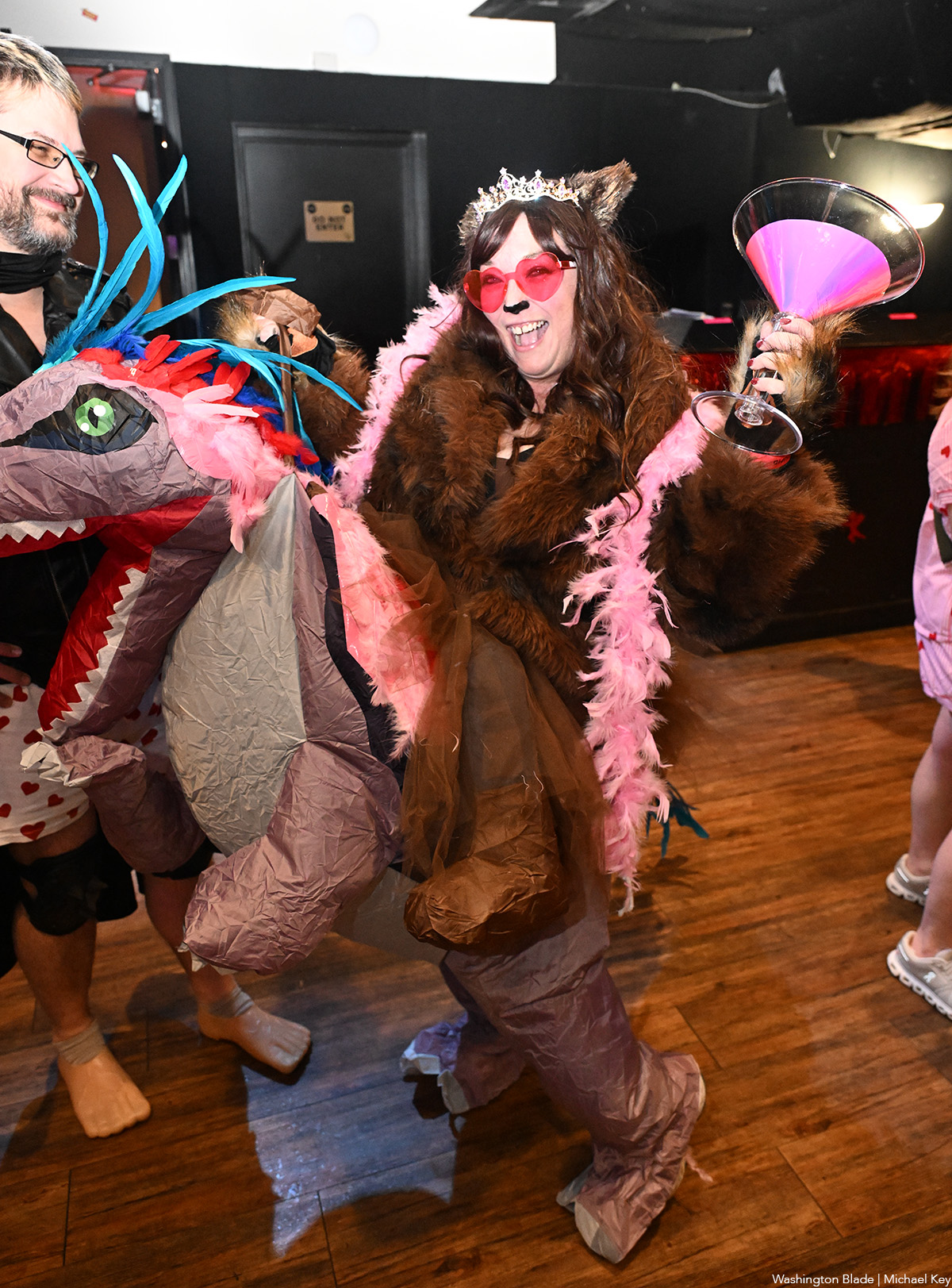
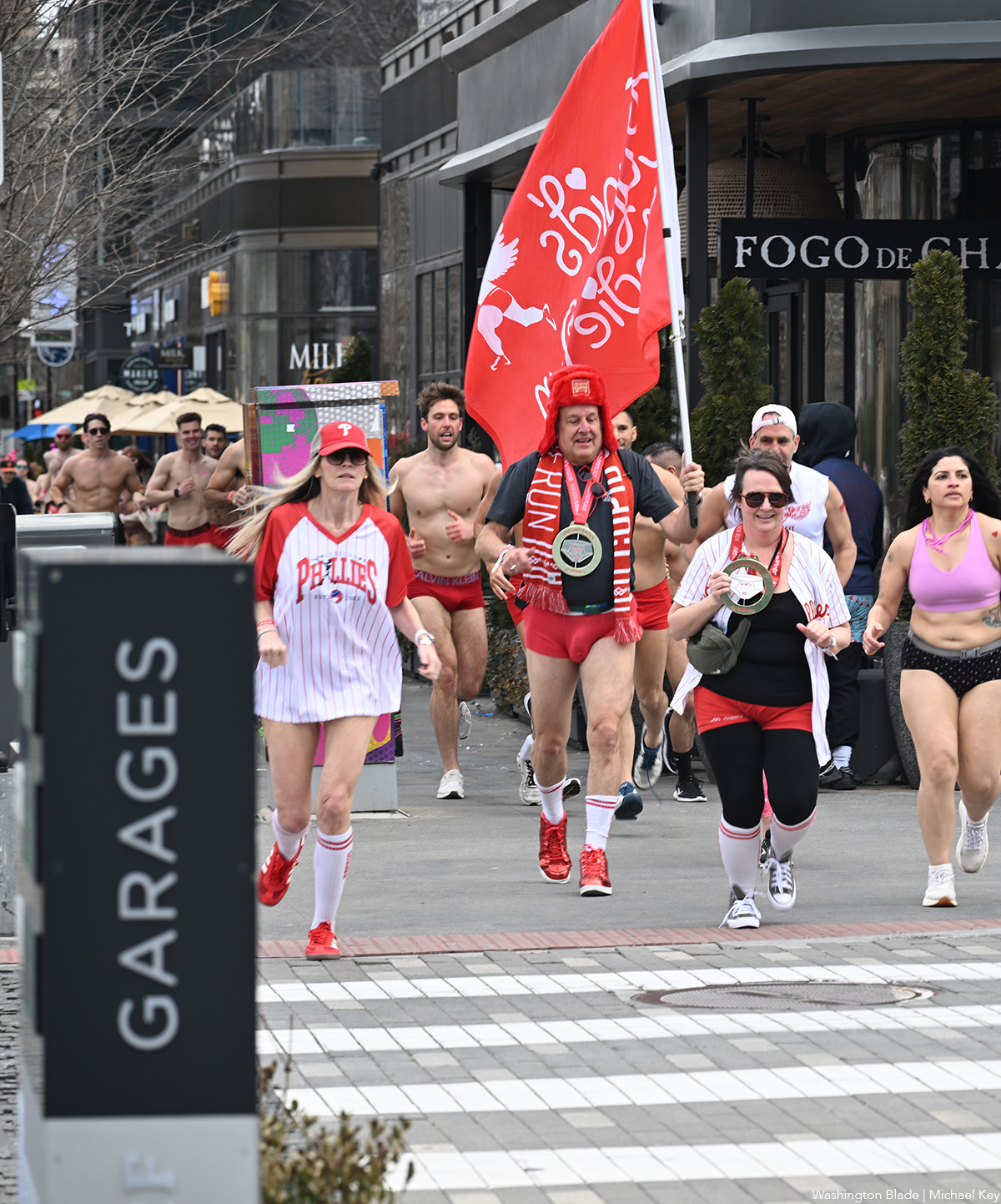
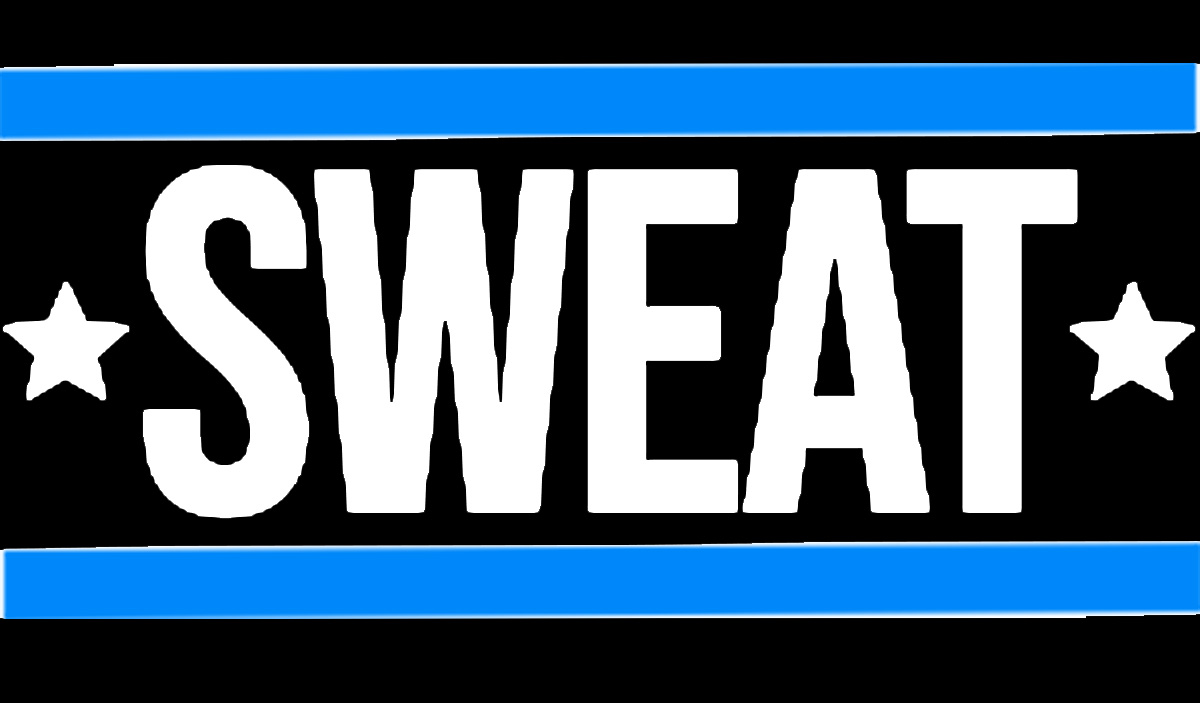
Sweat DC is officially expanding to Shaw, opening a new location at 1818 7th St., N.W., on Saturday, March 28 — and they’re kicking things off with a high-energy, community-first launch event.
To celebrate, Sweat DC is hosting Sweat Fest, a free community workout and social on Saturday, March 14, at 10 a.m. at the historic Howard Theatre. The event features a group fitness class, live DJ, local food and wellness partners, and a mission-driven partnership with the Open Goal Project, which works to expand access to youth soccer for players from marginalized communities.
For more details, visit Sweat DC’s website and reserve a spot on Eventbrite.

Friday, Feb. 20
Center Aging Monthly Luncheon with Yoga will be at noon at the D.C. LGBTQ+ Community Center. Email Mac at [email protected] if you require ASL interpreter assistance, have any dietary restrictions, or questions about this event.
Trans and Genderqueer Game Night will be at 7 p.m. at the D.C. Center. This will be a relaxing, laid-back evening of games and fun. All are welcome! We’ll have card and board games on hand. Feel free to bring your own games to share. For more details, visit the Center’s website.
Go Gay DC will host “First Friday LGBTQ+ Community Social” at 7 p.m. at Hotel Zena. This is a chance to relax, make new friends, and enjoy happy hour specials at this classic retro venue. Attendance is free and more details are available on Eventbrite.
Saturday, Feb. 21
Go Gay DC will host “LGBTQ+ Community Brunch” at 11 a.m. at Freddie’s Beach Bar & Restaurant. This fun weekly event brings the DMV area LGBTQ community, including allies, together for delicious food and conversation. Attendance is free and more details are available on Eventbrite.
LGBTQ People of Color will be at 7 p.m. on Zoom. This peer support group is an outlet for LGBTQ People of Color to come together and talk about anything affecting them in a space that strives to be safe and judgement free. There are all sorts of activities like watching movies, poetry events, storytelling, and just hanging out with others. For more information and events, visit thedccenter.org/poc or facebook.com/centerpoc.
Sunday, Feb. 22
Queer Talk DC will host “The Black Gay Flea Market” at 1 p.m. at Doubles in Petworth. There will be more than 15 Black queer vendors from all over the DMV in one spot. The event’s organizers have reserved the large back patio for all vendors, and the speak easy for bar service, which will be serving curated cocktails made just for the event (cash bar.) DJ Fay and DJ Jam 2x will be spinning the entire event. For more details, visit Eventbrite.
Monday, Feb. 23
“Center Aging: Monday Coffee Klatch” will be at 10 a.m. on Zoom. This is a social hour for older LGBTQ adults. Guests are encouraged to bring a beverage of choice. For more information, contact Adam at [email protected].
Tuesday, Feb. 24
Coming Out Discussion Group will be at 7 p.m. on Zoom. This is a safe space to share experiences about coming out and discuss topics as it relates to doing so — by sharing struggles and victories the group allows those newly coming out and who have been out for a while to learn from others. For more details, visit the group’s Facebook.
Genderqueer DC will be at 7 p.m. on Zoom. This is a support group for people who identify outside of the gender binary, whether you’re bigender, agender, genderfluid, or just know that you’re not 100 percent cis. For more details, visit genderqueerdc.org or Facebook.
Wednesday, Feb. 25
Job Club will be at 6 p.m. on Zoom upon request. This is a weekly job support program to help job entrants and seekers, including the long-term unemployed, improve self-confidence, motivation, resilience and productivity for effective job searches and networking — allowing participants to move away from being merely “applicants” toward being “candidates.” For more information, email [email protected] or visit thedccenter.org/careers.
Asexual and Aromantic Group will meet at 7 p.m. on Zoom. This is a space where people who are questioning this aspect of their identity or those who identify as asexual and/or aromantic can come together, share stories and experiences, and discuss various topics. For more details, email [email protected].
Thursday, Feb. 26
The DC Center’s Fresh Produce Program will be held all day at the DC Center. To be more fair with who is receiving boxes, the program is moving to a lottery system. People will be informed on Wednesday at 5 p.m. if they are picked to receive a produce box. No proof of residency or income is required. For more information, email [email protected] or call 202-682-2245.
Virtual Yoga Class will be at 7 p.m. on Zoom. This free weekly class is a combination of yoga, breathwork and meditation that allows LGBTQ community members to continue their healing journey with somatic and mindfulness practices. For more details, visit the DC Center’s website.

